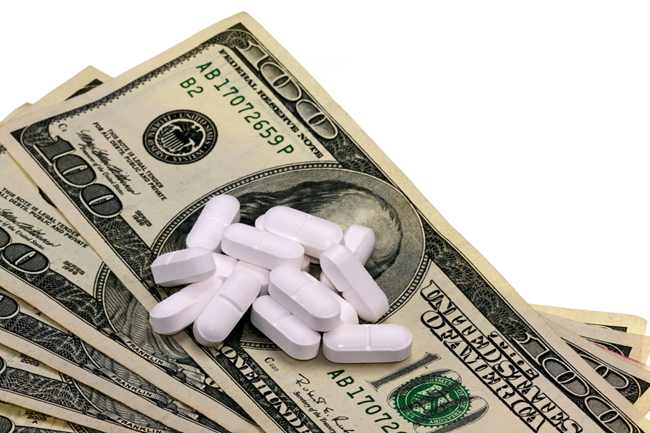A staggeringly large number of people are hurt or killed by pharmaceuticals each year. Medical mistakes and pharmaceutical induced injuries are the 4th most common cause of death in American hospitals (1).
Casualties reveal that the medical system is broken, and it is broken in ways that are systemic, complex and difficult to fix.
Every large system that works well has a foundation of checks and balances that keeps power from being too concentrated. Unchecked power corrupts – it has been shown to be true millions of times throughout history. The need for checks and balances on the power of pharmaceutical companies is just as great as the need for checks and balances on the power of any given branch of the government. There are organizations, individuals and institutions, that should be checking and balancing the power of pharmaceutical companies, and keeping them from maiming and killing thousands of people each year; but those organizations and institutions are failing. They are not keeping the pharmaceutical industry in check, and thus, the problems with the pharmaceutical industry are systemic.
Here is a list of institutions and groups of people who are supposed to be protecting the public from the pharmaceutical companies, but who are not:
The FDA does not Regulate the Pharmaceutical Industry
It’s self-evident that the FDA is failing. Deaths from pharmaceuticals don’t get to the point where thousands of people needlessly die each year while using drugs as prescribed when a regulatory agency is doing its job. “Every week, about 53,000 excess hospitalizations and about 2400 excess deaths occur in the United States among people taking properly prescribed drugs to be healthier. One in every five drugs approved ends up causing serious harm, while one in ten provide substantial benefit compared to existing, established drugs(2).” This sorry state of affairs doesn’t happen with a regulatory agency that is working properly to protect the people.
Most people assume that the FDA tests drugs for safety. They don’t. The FDA reviews tests performed by the pharmaceutical companies, the same company that developed the drug and stands to profit from the drug(3). It’s a system that is rife with conflicts of interest and perverse incentives that allow dangerous and/or ineffective drugs onto the market.
The FDA is approving drugs that are linked to cancer in clinical trials (new diabetes drugs, Farxiga and Invocana showed high incidence of bladder cancer in clinical trials (4). CANCER. When it is discovered after drugs are released onto the market that they are cancer-causing, the FDA doesn’t remove them from the market or insist that pharmaceutical companies try again to make a better formula that DOESN’T CAUSE CANCER, they simply make the warning label longer – as is the case with TNF inhibitors like Humira and Enbrel (5,6).
Those at the FDA are apparently incapable of making connections between drugs and chronic diseases. When the FDA added the risk of permanent peripheral neuropathy to the 43 page warning label for fluoroquinolone antibiotics, they noted that the mechanism for action that caused the peripheral neuropathy was mitochondrial dysfunction. There are hundreds of studies that link mitochondrial dysfunction to every chronic disease of modernity (Alzheimer’s disease, Parkinson’s, autoimmune diseases, chronic fatigue syndrome / M.E., fibromyalgia, etc.), but rather than restrict the use of dangerous mitochondria damaging drugs like fluoroquinolones, they just increased the length of the label, and people keep getting sick from these drugs (7).
The FDA is not looking out for the people. The notion that they are actually protecting people from dangerous drugs is laughable.
The Courts Rule in Favor of the Pharmaceutical Industry
If you’re hurt by a drug, you can sue, right? After all, the United States is the most litigious country in the world. People sue for all sorts of things all the time, surely those who are legitimately hurt by pharmaceuticals have legal recourse, right? And the legal system must be keeping pharmaceutical companies from hurting people, right?
It’s not that easy.
If the “side-effect” of a drug that you suffer from is listed on the warning label for the drug, you can’t sue the drug companies for failure to warn. So, for example, if you develop a severe psychiatric illness like bipolar disorder or severe depression after taking Chantix, an anti-smoking drug, you can’t sue the manufacturer of the drug, even if your declined mental health ruins your life, because the warning label for Chantix says that serious psychiatric ill-effects have followed treatment with Chantix (8).
If the side-effect that you suffer from isn’t listed on the warning label for that drug, you’re not much better off than you are if it is. If it’s not listed on the warning label, the connection between the drug and the disease is not established and proving that the drug caused the adverse reaction is close to impossible.
Additionally, those who take generic drugs have no legal recourse against the manufacturers of the drugs, thanks to the U.S. Supreme Court. On June 24, 2013, the U.S. Supreme Court ruled that generic drug manufacturers could not be held liable for the effects of the pharmaceuticals that they manufacture. A New York Times piece pointed out that, “The decision is a significant victory for the generic drug industry, but further narrows the recourse for people who are injured by such drugs” (9). People who have been hurt by a drug manufactured by a generic drug company have no recourse now – no chance for justice – regardless of how horribly they are harmed by a drug. Lawyers aren’t even taking cases of people hurt by generic drugs.
The justice system is doing a horrible job at providing justice for those who have been hurt by pharmaceuticals. In not getting justice for the people who have been hurt by pharmaceuticals, they are giving the pharmaceutical industry no incentive to stop hurting people.
Media Ties to the Pharmaceutical Industry Hamper Objectivity
If you read a newspaper, news based magazine, or watch television news, you will be bombarded with advertisements for pharmaceuticals. A quick review of a few issues of Time, U.S. News and World Report and Reader’s Digest revealed that 15% of the advertisements in those “news” magazines were for pharmaceuticals. Television news programs are even worse with constant bombardment of advertisements for antidepressants, erectile dysfunction drugs, etc. How can we expect the news media to cover the dangers of drugs and the malfeasance of the pharmaceutical industry when advertisements from the pharmaceutical industry provide a significant portion of the revenue for those media sources?
I don’t believe that the media can be objective toward those who ensure their livelihood. Don’t bite the hand that feeds you, as they say – and the mainstream media is well-fed by the pharmaceutical industry.
Doctors and the Pharmaceutical Industry
Doctors generally know too little about the drugs that they prescribe. Most are not pharmacologists and they count on the FDA to tell them whether or not a drug is safe to use.
In some ways, I feel sorry for doctors. They don’t intend to hurt people with pharmaceuticals – they mean to help people with pharmaceuticals. There are good drugs that do what they’re supposed to do and even save lives. But the entire medical profession seems to have lost critical thinking skills when it comes to evaluating the appropriate use of powerful drugs. Drugs can do harm, and many pharmaceuticals do more harm than good. Admitting that will not mean that any physician has to have his or her prescription pads taken away.
There is an appropriate time and place for every type of health therapy – nutritional, herbal, pharmaceutical, etc. – but the dependence of physicians on the exclusive use of pharmaceuticals has made them so entrenched in the system, and so dependent on the pharmaceutical industry, that the questioning of the appropriateness of drug therapies is rarely done. Doctors aren’t keeping the pharmaceutical companies in check by questioning them and refusing to tolerate the inordinate number of harmful drugs going through their office because doctors cannot operate without those dangerous drugs. It’s a sad state of affairs.
Some push-back on the pharmaceutical industry by doctors is entirely appropriate. They should push back on the pharmaceutical industry – for their patients and for their conscience.
Pharmacists and the Pharmaceutical Industry
Pharmacists understand the mechanisms of drug actions. They are trained in pharmacology. They are the gate-keepers for dispensing drugs to the public. I cannot, for the life of me, figure out why there isn’t more uproar among them about harmful drugs.
Scientists and the Pharmaceutical Industry
Everything that I know about biochemistry, cellular biology, how drugs interact with cells, etc. is from journal articles written by scientists. I thank them very much for their work. It is with science that the fraud and crimes against humanity perpetrated by the pharmaceutical industry will be revealed.
Unfortunately, the pharmaceutical and agricultural biochemical corporations have a strangle-hold on much of the work being done by scientists. Objectivity and scientific principles are lost as health research is corrupted by corporate funding at multiple levels. Selection bias has been demonstrated repeatedly, showing that negative results in drug research are not published. Scientists are put in a difficult position as their status and livelihood depend on publishing (publish or perish) so, they must only publish positive findings. Moreover, much of their work and their institution’s research funding comes from the pharmaceutical companies, either directly with drug development or testing grants or indirectly via the NIH inasmuch as the NIH won’t fund adverse events research but only that which has the possibility of a drug discovery. Researchers who dare to question the safety of a particular drug are often disciplined by their institutions for fear that the institutions will lose the millions of dollars drug companies funneled to them, and then if the researcher does speak out, the personal campaigns against them by the drug companies will end their research career. It’s a very untenable position for anyone with a brain and a conscience.
Even though I understand that research scientists are in a difficult position, I get frustrated with the lack of screaming and grand-standing that I don’t see from the scientific community. Scientists have the tools to see the damaging effects of pharmaceuticals. They have the intelligence to connect the dots. They have the credibility to make a difference in people’s lives. They have the ability to save lives. But most aren’t screaming about the harm caused by drugs, partly for the reasons listed above, and partly because they seem to be stuck in an outdated mode of caution and gentlemanliness. They know that they can say that a drug is associated with a higher incidence of cancer, but they are reluctant to say that the drug CAUSED the cancer. They can say that a drug had hugely harmful effects on the cells of rats, but they are reluctant to make any recommendations about human use of those drugs based on those studies of rats – even though the rats are effectively canaries in the coalmine and screaming about hurt rats may prevent future hurt humans. I understand this caution and the rules of science. But it would be really nice if more scientists were using their credibility and intelligence to push back against the pharmaceutical industry.
The People Must Resist Pharmaceutical Industry Marketing
Without the FDA, the media, the justice system, doctors, pharmacists or scientists standing up to the pharmaceutical companies and putting a check on their (currently unmitigated) power, patients are left to fend for themselves. Unfortunately, most patients don’t have the time or capability of doing the necessary research to determine the safety of any given drug. Patients depend on the system to have checks and balances to keep them safe, but those systems that are supposed to be providing checks and balances are failing.
I don’t think that the pharmaceutical companies are evil entities that are conspiring to decrease the world’s population. But I do think that they are profit motivated businesses with obligations to enrich their shareholders, and that their obligations to enrich their shareholders are in direct conflict with any mission of making the people that they sell drugs to healthy. There is an inherent conflict of interest born from the fact that sick, especially chronically ill, people are the best customers of pharmaceutical companies. A poisoned, sick, population is in nobody’s interest except those who leach money from the ill.
Systematic corrections are needed to fix the problem of an obscene numbers of casualties from the pharmaceutical industry.
Stopping the pharmaceutical companies from hurting people is the right thing to do. I hope that the FDA, the media, the justice system, doctors, pharmacists and scientists start doing so.
We Need Your Help
More people than ever are reading Hormones Matter, a testament to the need for independent voices in health and medicine. We are not funded and accept limited advertising. Unlike many health sites, we don’t force you to purchase a subscription. We believe health information should be open to all. If you read Hormones Matter, like it, please help support it. Contribute now.
Yes, I would like to support Hormones Matter.
Sources:
- Journal of American Medicine, “Incidence of Adverse Drug Reactions in Hospitalized Patients”
- Harvard University Edmond J. Safra Center For Ethics, “Risky Drugs: Why the FDA Cannot be Trusted”
- FDA Drug Development and Approval Process
- Huffington Post Healthy Living, “Farxiga, Just Approved by FDA, Uses New Approach to Treat Diabetes”
- Medscape Medical News, “FDA Safety Changes: Humira”
- FDA Warning Label: Humira
- Department of Health and Human Services Public Health Service Food and Drug Administration Center for Drug Evaluation and Research Office of Surveillance and Epidemiology, Pharmacovigilance Review, April 17, 2013, “Disabling Peripheral Neuropathy Associated with Systemic Fluoroquinolone Exposure”
- Chantix Warning Label
- New York Times, “In 5-4 Ruling, Justices Say Generic Makers Are Not Liable for Design of Drugs”













